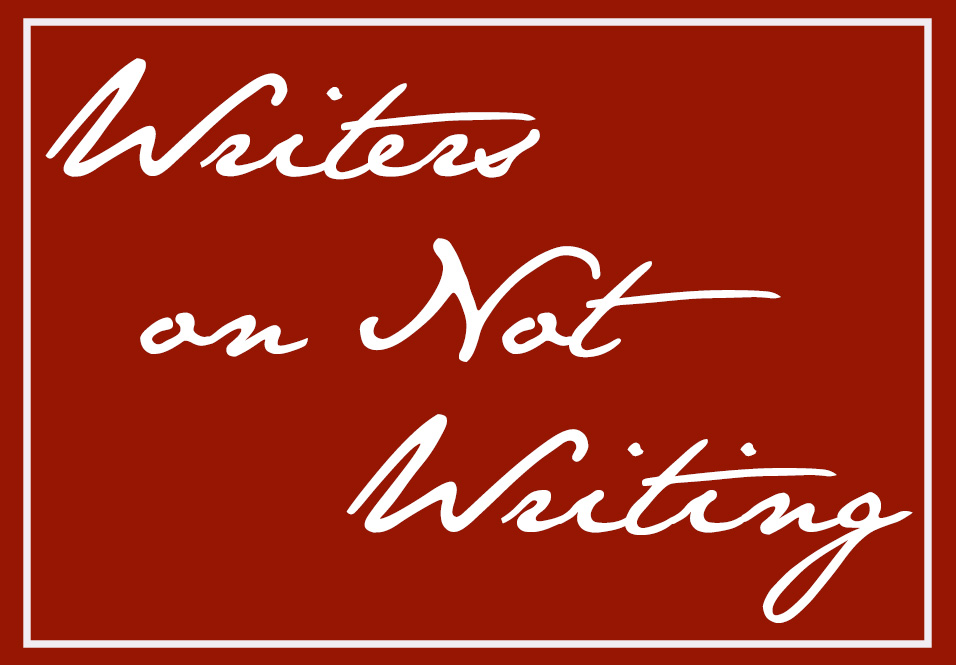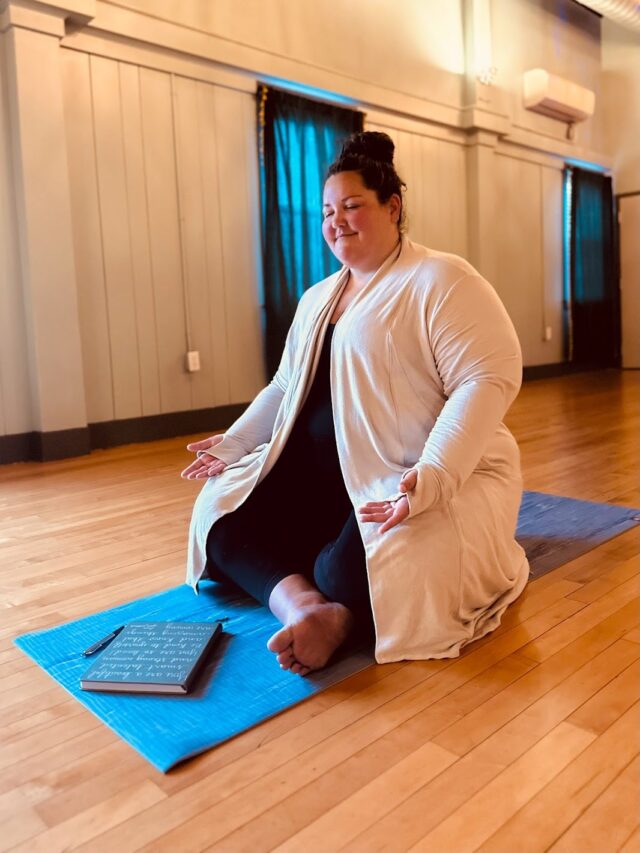Writers pour so much energy into their craft that sometimes we forget that creative pursuits other than writing can fill us up in other important ways. Here, we’ll look at what writers do when they aren’t writing, and how those pursuits affect the return to the page. This month, I posed my questions to two of my writing friends, Elisha Emerson and Emma Bouthillette—who do not know each other—and their answers about how physical movement creates a dreamscape are enchantingly similar.

Over the years, I’ve cycled through a number of creative pursuits. A while ago, I worked my way through Betty Edwards’s no-joke brilliant book, Drawing on the Right Side of the Brain. Since then, when time allows, I’ve pegged away at portraits of loved ones blowing out candles on birthday cakes. When my children were younger, I went through a frustrated and, consequently, fleeting sewing phase. I’ve dabbled in baking and embroidery. I believe that learning any new skill, whether it’s learning how to tie knots or read Latin, creates novel pathways in thinking that inform new perspectives and, at least to some extent, fresher writing.
Lately, however, between working full time, writing, chauffeuring teenagers, and maintaining healthy relationships, I’ve had to simplify my extraneous pursuits. These days, I’m into walking.
If you’ve read Julie Cameron’s The Artist’s Way, you’re familiar with the notion that walking can be a radical act. Walking gets the body moving, which gets the brain moving in novel ways. There’s the rhythm of steps and changing scenery—a wooded path, city sidewalk, even a parking lot will work. While walking, I find it easier to engage in conversation with the world and the self that hangs loosely between thought, feeling, and intention. I’m physically, spatially, and linguistically engaged but not focused on anything in particular. Walking makes more accessible those yet-to-be-formed feelings, the wacky jolts of inspiration.
On my best walks, I don’t return to the page but carry the page with me, pausing to scribble snatched lines and impressions as I go. Sometimes, I record my voice on my phone. A line like, I don’t think children should be responsible for their mothers’ backs (an illusion to the childhood rhyme “Don’t step on a crack”) floats, a dandelion seed. This line might not make it to the final page. Still, I’m convinced it’s a part of the work. Before this line arrived, I didn’t realize I wanted to write about my mother.
I strongly believe that accessing and honoring this dream self leads me back to a working brain that is not only roomier, but better capable of bypassing the mundane clutter of my typical thought patterns, and I’m better positioned to discover richer connections outside my bedroom’s four walls.
Elisha Emerson
My life is filled with creative pursuits—knitting, sewing, cross stitch, painting, doodling, collage, gardening, and house projects to name a few. While all of these things fill up my time not writing, yoga also became an integral part of my life seven years ago. In the months before my first book A Brief History of Biddeford was published, I walked into a small yoga studio in Saco, Maine, for a workshop that focused on mantra, meditation, and movement. It wasn’t the first time I had walked into a yoga studio, but it was the first time I felt welcomed as a large woman in a space dedicated to physical movement. I continued taking classes and, within months, dove into yoga teacher training—a surprising life shift for someone who loathed physical education in grade school, never enjoyed team sports, and found gyms utterly boring.
What I learned, rooted in the Yoga Sutras of Patañjali, is that there are eight limbs of yoga and rolling out a mat to move your body between different postures is only one. I have spent my thirties honing the asana practice, developing a meditation practice, learning from my mentors, and teaching to others at Samudra in Biddeford, Maine.
 “Flow state,” as coined by Hungarian-American psychologist Mihaly Csikszentmihalyi in 1990, is “a state in which people are so involved in an activity that nothing else seems to matter; the experience is so enjoyable that people will continue to do it even at great cost, for the sheer sake of doing it.” Achieving this flow state is like when a surfer drops in on a wave—the moment when the wave takes over and popping up to stand on the board is almost effortless. That’s what I find satisfying about the craft of writing, as well as all my non-writing pursuits. In addition to yoga and meditation, the hobbies I enjoy share this common opportunity of tapping into a space where everything else melts away. The only thing that matters is the task at hand, not the news cycle or social media, not that thing I said to someone two weeks ago, or what I want for dinner. As I have developed my yoga and meditation practice, I find dropping into the flow state—on my mat, on my meditation cushion, in the garden, wielding knitting needles, or behind the keyboard—increasingly easier to tap into.
“Flow state,” as coined by Hungarian-American psychologist Mihaly Csikszentmihalyi in 1990, is “a state in which people are so involved in an activity that nothing else seems to matter; the experience is so enjoyable that people will continue to do it even at great cost, for the sheer sake of doing it.” Achieving this flow state is like when a surfer drops in on a wave—the moment when the wave takes over and popping up to stand on the board is almost effortless. That’s what I find satisfying about the craft of writing, as well as all my non-writing pursuits. In addition to yoga and meditation, the hobbies I enjoy share this common opportunity of tapping into a space where everything else melts away. The only thing that matters is the task at hand, not the news cycle or social media, not that thing I said to someone two weeks ago, or what I want for dinner. As I have developed my yoga and meditation practice, I find dropping into the flow state—on my mat, on my meditation cushion, in the garden, wielding knitting needles, or behind the keyboard—increasingly easier to tap into.
Part of my brain is always thinking about writing, even if on a subconscious level. Over the past two years, my writing focus has been on a coming of body memoir in which I navigate the chronic conditions born out of a benign brain tumor, including hypothalamic obesity, and my journey towards radical self acceptance. Doctors diagnosed the tumor when I was just five years old. I am now thirty-eight, trying to recall certain events and reflect on how things felt at the time. Without intention, I find myself unlocking key moments relevant to the memoir in the middle of asana or meditation practice. When this happens, I am almost always surprised because I never set an expectation that my practice will shed light on my writing even though it so often it guides me back to the page.
Emma Bouthillette
Elisha Emerson’s work has been published in The Missouri Review, The Dalhousie Review, Solstice Magazine, Literary Mama, SBLAAM, and other places. Her nonfiction won Solstice’s 2022 Contest and has been nominated for a Pushcart Prize and Best of the Net. She holds an MFA in fiction from the University of Southern Maine’s Stonecoast Program and volunteers as a screener for Ploughshares.
Emma Bouthillette is a marketer, writer, yoga instructor, and corgi mom living in Biddeford, Maine. She studied English literature at the University of New England, documentary writing at the Salt Institute for Documentary Studies, and received her Master of Fine Arts in creative nonfiction from the University of Southern Maine Stonecoast program. In addition to publishing A Brief History of Biddeford with The History Press in 2017, her byline has appeared in the Portland Press Herald, Maine Women Magazine, and several other Maine-based publications.
Curated by Jen Dupree
